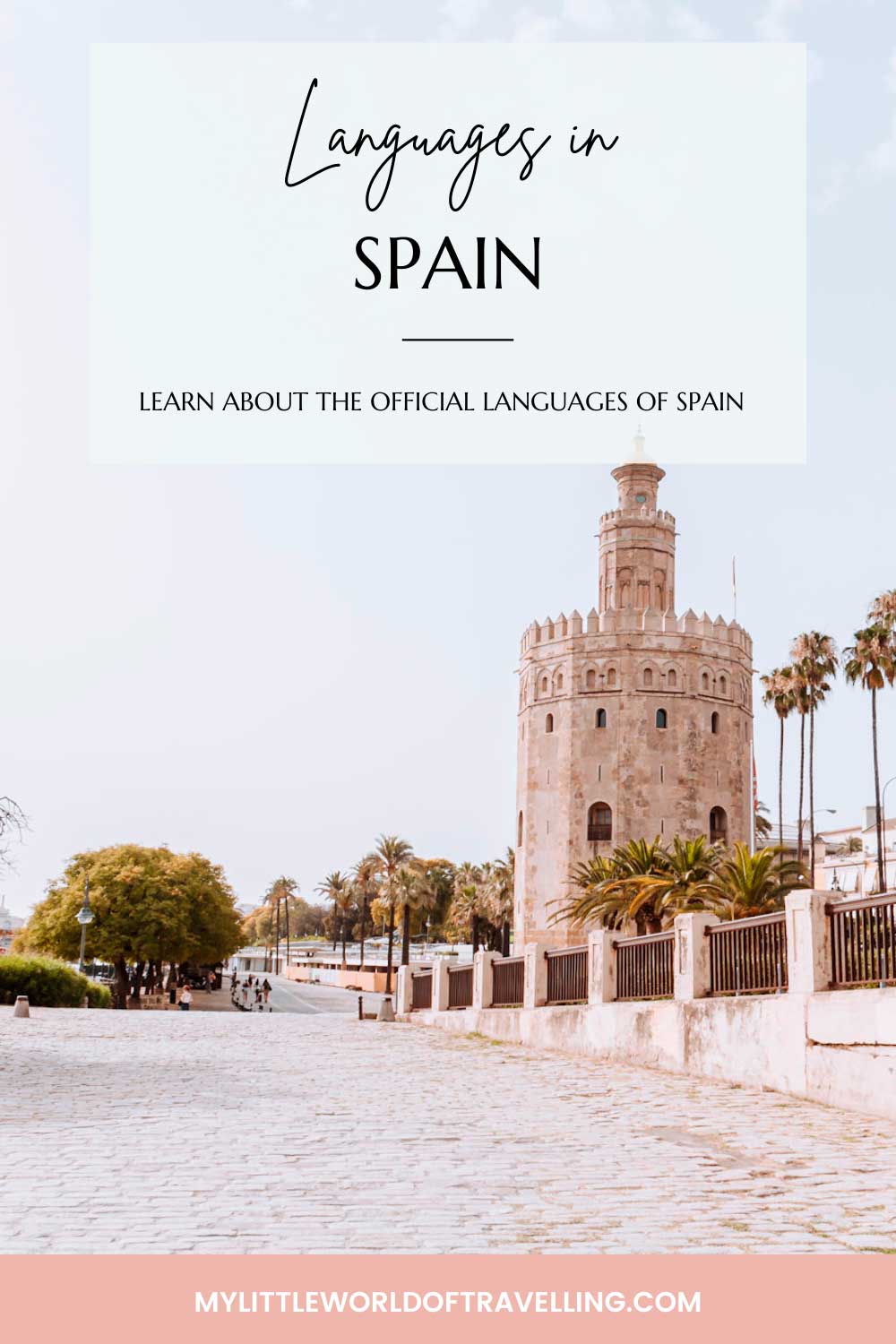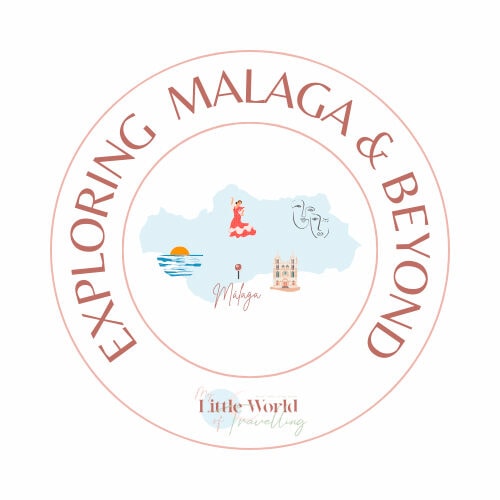Languages in Spain (There’s more than one!)
Did you know there are several official languages in Spain?
Castilian or Spanish (Castellano) is the most spoken language across the country; however, other official languages originated many years ago and are still spoken in different counties. These are Catalan, Basque and Galician.
Whether you love everything Spain-related, want to know more about the diverse culture in Spain or maybe learn one of these languages, this guide is for you.
As a former Foreign Language Teacher and Translator, I’ll share the history and some popular words for each language and tell you about non-official languages and dialects across the country.

This post contains affiliate links, and as an Amazon Associate, I earn from qualifying purchases. If you click through and purchase something, I receive a small commission on the price at no extra cost to you. This helps me keep the content up to date and make other improvements to the blog.
Official languages of Spain
Castilian
Where it is spoken: All regions of Spain
Spanish, known as Castillian, is Spain’s official language and the one that is widely spoken in the country. This romance language has been spoken approximately since the 8th century.
The first version of Castillian was influenced by Latin, Greek and Celtic. However, Castillian had a big influence from Arabic with the Moorish invasion of Spain. This is why you can find many similar words between Arabic and Spanish.
Castillian is the language used throughout the country, from governmental and political matters to media and education. It might be the standard version of Spanish, but there are many regional accents and dialects that make it even more complex.
When you learn Spanish abroad, most listening activities use the clearest Castilian language, which is found in Madrid, Salamanca and other central Spanish destinations. However, regional accents like Andalusian are often a challenge.
Useful words and sentences in Castilian
- Hola – Hello
- Adiós – Bye
- ¿Cómo estás? – How are you?
- Bien – Good
- Gracias – Thank you
- De nada – You are welcome
- ¿Cuánto cuesta? – How much is it?
- Por favor – Please
- ¿Qué hora es? – What time is it?
- ¿Dónde está el hotel? – Where is the hotel?
Catalan

Where it is spoken: Catalonia, Valencia and Balearic Islands
Catalan is the second most known and spoken language in Spain. You’ve probably heard of Catalan before and associated it with Barcelona, but the truth is that it’s spoken in other parts of Spain, such as Valencia and the Balearic Islands; just be aware that even if it’s Catalan, there are some variations.
Catalan dates back to the 8th century and emerged in parts of Catalonia as well as Andorra. However, it expanded to the whole region and other parts of Spain, such as the Valencian Community, Balearic Islands and parts of Aragon, between the 12th and 13th centuries.
It is such a rich language that it is not only spoken in Spain but parts of France and Italy too.
If you plan to move to Catalonia, you don’t necessarily need to know Catalan, as Spanish is widely spoken too; however, learning Catalan is extremely useful to engage with locals and get to know more about the culture.
I’ve visited Barcelona a couple of times, and although many locals will speak to you in Spanish, you’ll also find the odd local that will want you to speak Catalan. It’s happened to me.
Useful words and sentences in Catalan
- Hola – Hello
- Adéu – Bye
- Com estas? – How are you?
- Bon – Good
- Gracies or Merci – Thank you
- De res – You are welcome
- Quant costa? – How much is it?
- Si us plau – Please
- A quina hora? – What time is it?
- On és l’hotel? – Where is the hotel?
Galician
Where it is spoken: Galicia
Galician (Gallego) is another official language in Spain. It’s spoken in Galicia and has many similarities to Spanish and Portuguese since Galicia is close to the Portuguese border. However, it isn’t Portuguese.
Surprisingly, Galician is also spoken in other areas, such as Asturias and Castile and Leon.
This Indo-European language which belongs to the Romance languages, dates back centuries. The first text in Galician is from 1228.
In the beginning, it was a very recognised language and used in literature, but this changed after some political issues. Galician was recognised as an official language in Galicia in 1981. Since then, Galician has been used in different situations, from politics and administration to education.
Do you need to know Galician to travel around Galicia and its surroundings? No, most locals are bilingual and will speak to you in Spanish.
Useful words and sentences in Galician
- Ola – Hello
- Adeus – Bye
- Como estás? – How are you?
- Bo – Good
- Grazas – Thank you
- Es Benvido – You are welcome
- Canto custa? – How much is it?
- Por favor – Please
- Que hora é? – What time is it?
- Onde este hotel? – Where is the hotel?
Basque

Where it is spoken: Basque Country
Last but not least, Basque, called Euskera, is also among Spain’s official languages. There have many studies by linguists and researchers, but they couldn’t exactly determine when Euskera originated. However, some believe that Basque dates back to the Neolithic.
Euskera is a unique and isolated language that can’t be related to other Romance languages and doesn’t sound like Castilian.
Most locals choose to speak Basque between them, but they’re bilingual, so they have a proficient level of Spanish. If you plan to visit Basque Country, you have the opportunity to hear two languages, which is fascinating.
Useful words and sentences in Basque
- Kaixo – Hello
- Agur – Bye
- Zelan zaude? – How are you?
- Ona – Good
- Eskerrik asko – Thank you
- Ez horregatik – You are welcome
- Zenbat da? – How much is it?
- Mesedez – Please
- Zer ordu da? – What time is it?
- Non dago hotela? – Where is the hotel?
Regional dialects in Spain

Castillian, Catalan, Galician and Basque are the official languages in Spain, but when it comes to Castilian, there isn’t a standard and single Castilian in the whole country.
You’ll find many regional accents across Spain. Each regional accent has unique sounds, plus words you probably won’t use in other parts of Spain. Of course, every Spaniard can understand each other, despite these differences, because at the end of the day is just a slight variation in pronunciation and words.
Some of the most popular dialects are Andalusian, Leonese, Canary and Aragonese.
I’m from Andalusia, and I can tell you that accent varies from city to city. Specifically, I’m from Malaga, and some words that are used in Malaga aren’t used in Seville or Cadiz. It’s quite impressive how creative the Spanish language is.
The best place to study Castilian Spanish
If you wonder where is the best place to study Castilian, these are some of the most popular cities among Spanish learners:
Salamanca
Salamanca, located in the northwest of Spain, is a top choice for studying Castilian. First, the Castilian spoken in Salamanca is quite clear, and it’s what you would call “standard” Spanish that is easy to understand.
Second, Salamanca is home to one of the most important universities in the country (Universidad de Salamanca), so there isn’t doubt that it attracts so many international students.
Last but not least, it’s affordable and relatively close to big cities like Madrid.
Granada

If you want a taste of Southern Spain, Granada is such a good city to immerse yourself in Spanish culture.
Granada is rich in culture in many ways, from historical buildings, including UNESCO World Heritage Sites like the Alhambra, and architecture to food and dancing traditions.
However, it’s worth mentioning that learning Castilian in Granada can be a little challenging because of the Andalusian accent. So, if you’re up for a challenge, you won’t regret studying Spanish in this charming city.
Madrid
Spain’s capital has to make it to the list. The city is vibrant, lively and full of opportunities. Learning Castilian in Madrid is an excellent option because the accent is much easier than in other parts of Spain.
In addition to this, it’s very multicultural, while you can still immerse yourself in the Spanish lifestyle.
The downside of studying in Madrid is the accommodation prices. Renting a bedroom or an entire flat is quite expensive compared to Granada and other Southern Spain destinations.
Other destinations to learn Spanish

The top destination mentioned above are the popular options, but there are other places you might want to consider because they’re cheaper, have a good expat community, and the leisure activities are fantastic too.
- Malaga
- Alicante
- Murcia
- Seville
- Valencia
Frequently asked questions about languages in Spain
How many languages do they speak in Spain?
There are four languages in Spain, although Spanish is the most spoken.
What are the 4 official languages in Spain?
Castilian (Spanish), Catalan, Galician and Basque.
How is Catalan different from Spanish?
Catalan is a mix of different European languages, and it’s considered a Romance language. Although it has similarities with Spanish or Castilian, it is also similar to Italian and French.
What part of Spain speaks Catalan?
Catalonia, Valencian Community and the Balearic Islands.
Conclusion on languages in Spain
Spain is rich in culture, and this can be seen in its different languages and regional dialects.
Nowadays, these languages are part of the diverse Spanish culture and are respected and recognised in the country. However, it hasn’t always been like this.
Basque, Catalan and Galician were banned during the dictatorship of Franco, which took place between 1939 and 1975. However, there were informal institutions teaching these languages to keep them alive.
With the arrival of democracy in Spain, these regional languages continued to be developed and became part of daily life.
If you’re interested in learning Spanish, I highly recommend Duolingo for basic vocabulary and grammar, but if you want to become an intermediate or advanced student of Spanish, it’s worth checking out Instituto Cervantes. They have face-to-face courses around different cities in the world and online courses too.
Do you have any questions about the Spanish language? Email me, and I’ll be happy to help you.
Happy learning!
Cristina x
Save this guide on languages in Spain on Pinterest for later

Do you want to learn Spanish? Check out these language resources:
- Start learning Spanish with Duolingo, a free app with many short lessons in which you can learn anything from vocabulary and grammar to pronunciation.
- If you love a good paper book, Easy Learning Spanish Complete Grammar, Verbs and Vocabulary includes key information for anyone who is looking for a Spanish book for beginners.
- Start making friends and practising your Spanish by joining events. I use MeetUp to find local groups and activities near me.
- Take affordable online lessons with native speakers with Preply.
Read more about Spain
- The Correct Pronunciation of Seville
- The Ultimate Barcelona Pronunciation Guide
- The Best Cities to Live in Spain
- 13 Cheapest Places to Live in Spain
- Living in Valencia vs Barcelona
- Living in Malaga vs Barcelona
- An Insider’s Guide to Living in Malaga as an Expat
- The 7 Biggest Mistakes When Moving to Spain & Other Tips
